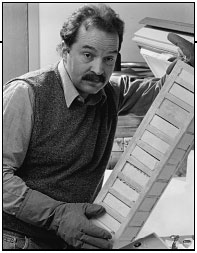Friend or foe? Noelle probes the immune system
When the body's immune system, which normally combats invasion by "foreign agents," is instead directed against the body itself, a phenomenon called autoimmunity ensues. Hundreds of thousands of Americans are afflicted by autoimmune diseases, including multiple sclerosis (MS) and lupus.
Renegade: The course of an autoimmune disease is unpredictable but is typically characterized by flare-ups and remissions of varying degree and duration; symptoms range from minor to life-threatening. The key to finding a cure for these potentially debilitating illnesses is understanding what causes a friendly immune system to turn against the very body that it's supposed to protect. Randolph Noelle, Ph.D., a professor of microbiology at DMS, after years of investigation, is uncovering the secrets of, and developing novel strategies to counteract, a renegade immune system.
The immune system operates like the body's "Central Intelligence Agency," constantly assessing who is friend and who is foe. When a foreign substance is identified, an elaborate system is set in action to target and eliminate intruders. Unfortunately, just as in the cloak-and-dagger world of espionage, the immune system is occasionally infiltrated by "double agents."
In the case of autoimmunity, one such double agent—CD40L (CD40 ligand)—has been identified by Noelle's lab. CD40L molecules are found primarily on the surface of white blood cells known as T cells. They control two facets of the immune system: they instruct another class of white blood cells, the B cells, to start producing target-specific antibodies; and they tell macrophages (which patrol the body and engulf foreign invaders) to initiate an inflammatory response, dilating blood vessels and attracting more macrophages to an infected area.

|
|
Randy Noelle has identified an antibody molecule that
may help to treat MS and other autoimmune diseases. |
Normally, CD40L molecules regulate antibody production and macrophage activation so only foreign agents are targeted. Sometimes, however, for reasons not yet fully understood, CD40L sends the wrong signals to the B cells and macrophages. This can lead to the production of antibodies that attack and destroy the body's own tissues or to an overactivation of macrophages, and in turn to an autoimmune or inflammatory disease.
MS, for example, results when antibodies attack the fatty sheath that insulates nerve cells, affecting a person's ability to make smooth, rapid, coordinated movements. The mechanisms are different in other autoimmune diseases, but the effects are similarly devastating.
The strategy proposed by Noelle to counter the ill effects of unfriendly CD40L is simply to block the transmission of its signals to B cells and macrophages. Ironically, the blocking agent of choice is itself an antibody molecule —one raised in an animal —against human CD40L.
However, before an animal antibody can be introduced into a human patient's body, it must first be disguised so it won't be recognized as a foreign agent.
The disguise Noelle uses involves combining the anti - CD40L fragment of the foreign antibody with what's called the constant fragment of the human antibody molecule. (An antibody comprises a "constant fragment" and "antibody fragments." The constant fragment forms the major portion of the molecule and is identical for all antibodies of a particular class. The smaller, variable antibody fragments determine each molecule's specificity.) This procedure is called humanizing the antibody.
Principle: Noelle has already demonstrated that the principle works in mice. Using this approach, mice have been successfully treated for MS, lupus, inflammatory bowel disease, and rheumatoid arthritis. What is more, in some cases, a brief treatment appears to be sufficient to confer long-term protection. A joint study by researchers at DMS and Northwestern showed that treatment with anti-CD40L antibody can help to prevent relapses as well as reduce the severity of symptoms in mice.
The next step is human clinical trials. Noelle is careful to stress that while the studies in mice have been encouraging, what works in an animal model is not necessarily as effective in humans. Currently, neurologist Lloyd Kasper, M.D., and pathologist William Hickey, M.D., are heading a Phase I clinical trial, assessing the safety of humanized anti-CD40L antibodies. If the method proves safe, then a Phase II trial, assessing the treatment's effectiveness, is anticipated to begin sometime in 2000. A nationwide study is also underway to determine the concept's safety and effectiveness in patients with active lupus. The next step would be testing it against other autoimmune diseases. It could even be used to counter the rejection of transplanted organs and tissues.
"The potential of this technology may be extremely signifi- cant," Noelle says.
Martin A. Grundy, Ph.D.
If you would like to offer any feedback about this article, we would welcome getting your comments at DartMed@Dartmouth.edu.
